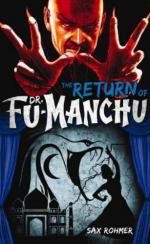CHAPTER XXII
THE MULATTO
The room in which Van Roon received us was roughly of the shape of an old-fashioned keyhole; one end of it occupied the base of the tower, upon which the remainder had evidently been built. In many respects it was a singular room, but the feature which caused me the greatest amazement was this:—it had no windows!
In the deep alcove formed by the tower sat Van Roon at a littered table, upon which stood an oil reading-lamp, green shaded, of the “Victoria” pattern, to furnish the entire illumination of the apartment. That bookshelves lined the rectangular portion of this strange study I divined, although that end of the place was dark as a catacomb. The walls were wood-paneled, and the ceiling was oaken beamed. A small bookshelf and tumble-down cabinet stood upon either side of the table, and the celebrated American author and traveler lay propped up in a long split-cane chair. He wore smoked glasses, and had a clean-shaven, olive face, with a profusion of jet black hair. He was garbed in a dirty red dressing-gown, and a perfect fog of cigar smoke hung in the room. He did not rise to greet us, but merely extended his right hand, between two fingers whereof he held Smith’s card.
“You will excuse the seeming discourtesy of an invalid, gentlemen?” he said; “but I am suffering from undue temerity in the interior of China!”
He waved his hand vaguely, and I saw that two rough deal chairs stood near the table. Smith and I seated ourselves, and my friend, leaning his elbow upon the table, looked fixedly at the face of the man whom we had come from London to visit. Although comparatively unfamiliar to the British public, the name of Van Roon was well-known in American literary circles; for he enjoyed in the United States a reputation somewhat similar to that which had rendered the name of our mutual friend, Sir Lionel Barton, a household word in England. It was Van Roon who, following in the footsteps of Madame Blavatsky, had sought out the haunts of the fabled mahatmas in the Himalayas, and Van Roon who had essayed to explore the fever swamps of Yucatan in quest of the secret of lost Atlantis; lastly, it was Van Roon, who, with an overland car specially built for him by a celebrated American firm, had undertaken the journey across China.
I studied the olive face with curiosity. Its natural impassivity was so greatly increased by the presence of the colored spectacles that my study was as profitless as if I had scrutinized the face of a carven Buddha. The mulatto had withdrawn, and in an atmosphere of gloom and tobacco smoke, Smith and I sat staring, perhaps rather rudely, at the object of our visit to the West Country.
“Mr. Van Roon,” began my friend abruptly, “you will no doubt have seen this paragraph. It appeared in this morning’s Daily Telegraph.”
He stood up, and taking out the cutting from his notebook, placed it on the table.




